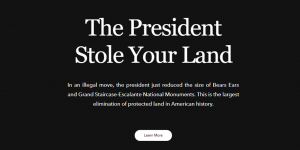- blog
- Corporate Purpose
Corporate purpose is not a new concept, yet more organizations than ever feel the pressure to explore and declare theirs. As a growing number of enterprises reexamine their purpose and take proactive stances on societal issues, a few checklists and frameworks have begun to emerge to help.
At the Page Up Annual Conference, I had the pleasure of moderating a discussion about corporate purpose, “New Rules for a New Reality.” I was joined by Peter Horst, a 30-year veteran marketer and author of a new book “Marketing in the Fake News Era;” Corley Kenna from Patagonia; Colleen Penhall from Lowe’s Companies, Inc.; Brooke Buchanan, former campaign strategist for the late Senator John McCain and SVP of communications for Whole Foods; and Elaine Dinos of Kindred Lane.
Peter Horst kicked off the discussion by presenting the realities of modern business, noting that companies operate in a turbulent environment and a brand or enterprise can be caught up in – and dragged down by – a controversary quickly. Examples include the blow back on companies who advertised on the Tucker Carlson and Sean Hannity television shows. Social activism in the form of consumer protest is on the rise, and tribalism is growing too.
The takeaway is that companies can no longer safely stand on the sidelines. Companies must think ahead, identifying societal issues that connect to their purpose and values, and those their employees, customers or others care about, so they are prepared to take action, or better yet, lead the way.
One of the best examples of a company leading the way is Patagonia. They are crystal clear on their purpose. As the founder Yvon Chouinard puts it “we’re in business to save our home planet.” Corley Kenna, head of communications at Patagonia, joined the panel conversation, remarking on an exciting moment in her first few months on the job; when Patagonia decided to sue the U.S. government over Bears Ears (a breathtaking, must-watch video, btw!).

Kenna says the fact that Patagonia made this bold move is not surprising as their customers would have expected nothing less. It was both an opportunity and an obligation. This example relates nicely to what Horst was speaking of when companies are grappling with what issues they should focus on. In doing so, he says there are a few fundamental questions to consider:
His point is that companies must be thoughtful and intentional, and have full knowledge of the implications of their actions. If your purpose is just a marketing campaign in green-washed clothing, it’s probably going to fail to find an audience (or worse.)
Paul Argenti, professor of corporate communications at the Tuck School of Business at Dartmouth, who closely studies the values of Fortune 100 companies, also spoke about this issue during the Page Annual Conference held one month before the Page Up Annual Conference. Argenti’s presentation focused on the right time for companies to engage in social issues. To determine this, he advised that companies go through the exercise of asking: How can organizations communicate their values in an authentic and consistent way in polarizing times? How can they determine when and how to respond to social and geopolitical changes? And, how should organizations think about the cost benefit calculations of their responses and strategies?
A company that went through a similar exercise is Southwest Airlines. Linda Rutherford, chief communications officer, shares an example of the company’s decision to sign on to the amicus briefing in defense of the marriage act that was going before the Supreme Court. While the court’s ruling would not alter how Southwest Airlines treats its LGBTQ employees’ benefits and opportunities (note: the company already supports LGBTQ rights and benefits, treating all employees equally), they felt it was important to take a stand and make the company’s position clear to the public. This decision-making process resulted in a new practice by the company when addressing societal issues.
Rutherford said it is important to start small and build if the company must, noting their guiding principles as speed, consistency and adherence to corporate values. “The purpose of Southwest Airlines is to connect people to what’s important in their lives and we want to make sure that with every decision we make, it is consistent with that purpose,” said Rutherford.
I can think of no better close than that. Make decisions consistent with your company’s purpose…oh, and be sure you are prepared when doing so.